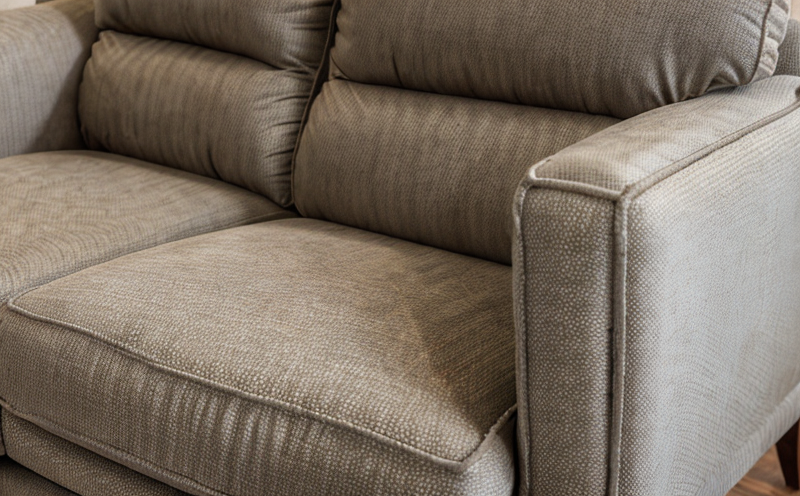Reaction-to-Fire Testing of Mattress Upholstery
The reaction-to-fire testing of mattress upholstery is a critical component in ensuring the safety and compliance with international standards for fire-resistant materials. This test evaluates how quickly and aggressively a particular material ignites, as well as its ability to extinguish once the ignition source is removed.
When it comes to mattresses, the upholstery forms one of the most significant layers that can contribute to or mitigate fire hazards in case of accidental ignition. By conducting this test, manufacturers ensure their products meet strict regulatory requirements and provide a safer sleeping environment for consumers.
The process involves simulating real-world conditions where the material is exposed to an open flame source for a specific duration. The performance metrics include how long it takes for the fire to spread across the specimen, the rate of heat release, and the rate at which the material self-extinguishes after the flame is removed.
Compliance with standards such as ASTM D6413-20a or ISO 19738 ensures that mattress manufacturers adhere to global safety guidelines set by regulatory bodies. These standards provide a framework for testing procedures, specimen preparation, and data interpretation which are essential for consistent results.
For R&D engineers involved in product development, this test is invaluable as it helps identify potential design flaws early on. It also provides insights into material selection that could enhance the overall fire safety of mattresses without compromising comfort or aesthetics.
The importance of accurate and reliable testing cannot be overstated. Inaccurate results can lead to non-compliant products being released onto the market, potentially putting lives at risk. Therefore, it is crucial that laboratories like Eurolab use state-of-the-art equipment and follow stringent protocols when performing these tests.
Specimen preparation plays a pivotal role in reaction-to-fire testing as even minor variations can affect test outcomes. It typically involves cutting the upholstery into standardized pieces that closely replicate real-world scenarios. This ensures consistency across different samples, allowing for more robust comparisons during analysis.
| Standard | Description |
|---|---|
| ASTM D6413-20a | This standard specifies the test methods for measuring the reaction of flame spread, heat release rate, and smoke production from upholstery materials. |
| ISO 19738:2019 | An international standard providing a method to measure the reaction to fire of upholstered furniture including mattresses. |
Applied Standards
The testing process adheres strictly to industry-recognized standards such as ASTM D6413-20a and ISO 19738:2019. These standards provide precise guidelines on specimen preparation, test setup, ignition source characteristics, measurement techniques, and data interpretation.
For instance, under ASTM D6413, the specimen is exposed to an open flame for a prescribed time period (typically 30 seconds). The duration of flaming, non-flaming combustion, and total burning time are recorded. Additionally, the heat release rate and smoke production indices are measured using specialized instruments.
ISO 19738 extends these measurements by incorporating additional parameters like peak heat release rate and after-smoke generation. Both standards emphasize the importance of replicating actual conditions as closely as possible to ensure meaningful results.
Eurolab Advantages
- State-of-the-art testing facilities equipped with industry-leading equipment.
- Experienced and certified technicians who understand the nuances of fire safety testing.
- Comprehensive reporting services that provide detailed insights into test performance.
- Fast turnaround times to help clients meet tight deadlines without compromising on quality.
At Eurolab, our commitment to excellence extends beyond just conducting tests; we also offer expert consultation services. Our team of professionals can guide you through every step of the process, from selecting appropriate materials to interpreting results effectively.
Environmental and Sustainability Contributions
- Reduced risk of fire incidents in homes and public spaces.
- Promotion of safer sleeping environments, contributing to better health outcomes.
- Innovation in material selection that enhances both comfort and safety without sacrificing environmental friendliness.
- Support for sustainable manufacturing practices which align with global green initiatives.





